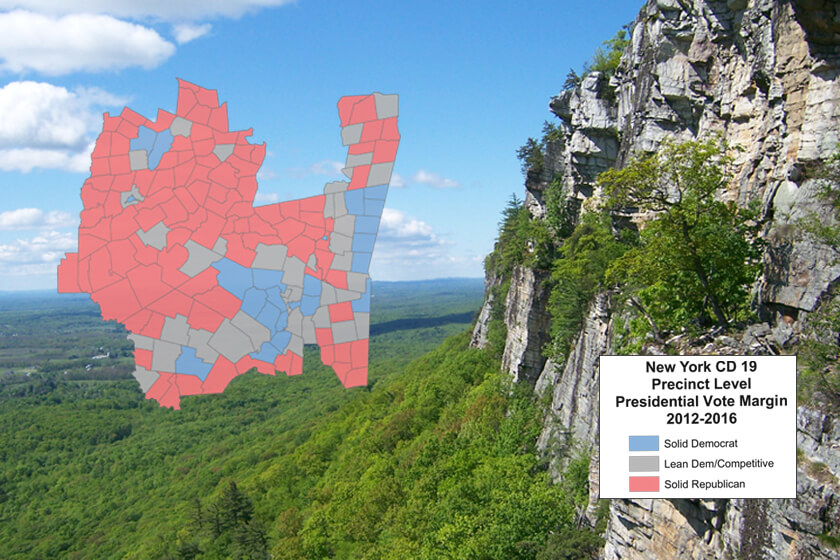West Long Branch, NJ – Democratic candidate Antonio Delgado has increased his lead over first-term Congressman John Faso in New York’s 19th Congressional District race, according to the latest Monmouth University Poll. The challenger has built on the small lead he held last month by strengthening his standing among women and making some gains east of the Hudson River.
Delgado currently holds a 49% to 44% edge over Faso among likely voters using Monmouth’s standard midterm turnout model. Another 3% support a third party or independent candidate and 4% are undecided. The race stands at 51% for Delgado and 43% for Faso using a model that incorporates a turnout surge in Democratic precincts similar to the turnout dynamic seen in some special elections held over the past year. A model projecting lower overall turnout shows Delgado with a 48% to 46% lead over Faso. In September, Delgado had a smaller 48% to 45% lead in the standard model, a 49% to 43% lead in the Democratic surge model and a 48% to 46% lead in the low turnout model. Leads in the current likely voter models are within the poll’s margin of error except for the Dem surge scenario.
Delgado has a sizable 54% to 38% advantage among female voters in the district. This is much wider than the 49% to 43% edge he had among women in September. Faso has a 51% to 44% lead among male voters, which is slightly better than his 47% to 45% edge among men last month.
The poll finds that Delgado has a 49% to 44% edge in the part of NY-19 located east of the Hudson River (Columbia, Dutchess, and Rensselaer counties). Likely voters in these three counties were split between Faso (48%) and Delgado (47%) in September. Delgado also continues to perform strongly in the southern part of the district (Sullivan and Ulster counties), with a lead of 55% to 39% over Faso there. This is similar to his 55% to 35% likely voter lead in this region last month. Faso’s strongest area is the western part of the district, where he holds a 51% to 43% lead over Delgado, which is similar to his 53% to 39% lead in this region last month.
Three-in-four (74%) likely voters say they have a lot of interest in the House race. This is identical to Monmouth’s September poll (74%). However, Republicans expressing high interest has increased from 63% to 79% over that time. Democratic voter interest has held steady (82% in September and 81% currently) while independent interest has declined (79% in September and 65% currently).
“The Democrat has strengthened his standing in this race even though Republican interest has picked up over the past month. GOP ads have focused on Delgado’s past as a hip hop artist in an effort to paint him as out of step with the district, but these attacks haven’t changed the overall trajectory of this race,” said Patrick Murray, director of the independent Monmouth University Polling Institute.
NY-19 voters are somewhat more likely to say that Delgado (42%) rather than Faso (36%) shares more of their values. Another 10% say that both candidates equally share their values and 7% volunteer that neither candidate shares their values.
Delgado gets a 42% favorable and 33% unfavorable rating from likely NY-19 voters, with 25% expressing no opinion. The challenger’s rating was 42% favorable and 25% unfavorable in September. Even though Delgado’s unfavorable number has increased, he still maintains a better positive to negative ratio than the incumbent. Faso currently gets a divided 38% favorable and 38% unfavorable rating, with 24% expressing no opinion. This is only slightly better than his 37% favorable and 43% unfavorable rating from a month ago.
The top voter concern among six policy areas asked about in the poll is health care (37%). This is followed by immigration (18%), taxes (15%), gun control (9%), jobs (9%), and abortion (6%). The number of NY-19 voters choosing health care as their most important issue has increased from 30% in Monmouth’s September poll and Delgado has a clear advantage on this concern. More voters say they trust the Democratic challenger (46%) over the Republican incumbent (32%) to work to keep health care affordable, while just 11% say they trust both equally and 9% volunteer that they trust neither one.
Voters are divided on who they trust more to handle illegal immigration – 36% choose Faso and 36% choose Delgado. Another 15% say they trust both candidates equally on this issue and 8% volunteer that they do not trust either candidate.
“The issue picture works to Delgado’s advantage. Voters who name health care as their top concern overwhelmingly back the Democrat. Immigration and taxes are key issues for Faso supporters, but concerns about these policies are just not as widespread in the district,” said Murray.
President Donald Trump’s job rating in New York’s 19th District stands at 46% approve and 51% disapprove. He had a nominally more positive rating of 50% approve and 48% disapprove last month. Overall, 69% of likely voters say that the president is a very important factor in their House vote, which is down from 78% in the prior poll. Trump opponents (77%) continue to be somewhat more likely than Trump supporters (72%) to feel this way, although the gap was wider in September (87% opponents and 75% supporters). Currently, 37% of likely voters say Faso has been too supportive of the president, which is similar to 35% who felt that way last month.
NY-19 likely voters’ preference for party control of Congress has swung slightly toward the Democrats – 43% now prefer to see Democratic control and 40% prefer to see Republican control. In September, 42% preferred Republican control and 41% preferred Democratic control. Voters in the district also remain more negative than positive on the GOP’s signature legislative accomplishment. While 39% approve of the tax reform plan passed last year, 47% disapprove. These results are similar to the 40% approve and 45% disapprove rating the tax plan received last month.
“It’s still not a done deal by any stretch, but small shifts in party preferences toward the Democrats are making it tougher for Faso to hang onto this seat,” said Murray.
New York’s 19th is considered a “pivot” district, having voted for Barack Obama for president in 2012 (by 6 points) and for Trump in 2016 (by 7 points). Faso entered the House by winning an open seat two years ago by 8 points.
The Monmouth University Poll was conducted by telephone from October 24 to 28, 2018 with 372 likely voters in New York’s 19th Congressional District. The question results in this release have a margin of error of +/- 5.1 percentage points. The error of the difference between the two candidates’ vote share (i.e. the “lead”) is +/-7.2 percentage points. The poll was conducted by the Monmouth University Polling Institute in West Long Branch, NJ.
QUESTIONS AND RESULTS
(* Some columns may not add to 100% due to rounding.)
1/2. If the election for U.S. House of Representatives in your district was today, would you vote for John Faso the Republican, Antonio Delgado the Democrat, Steven Greenfield of the Green Party, or some other candidate? [IF UNDECIDED: If you had to vote for one of the following at this moment, do you lean more toward John Faso or more toward Antonio Delgado? [NAMES WERE ROTATED]
| Likely Voters
with leaners |
Oct. 2018 |
Sept. 2018 | ||||
|
Standard |
Democratic |
Low |
Standard |
Democratic |
Low | |
| John Faso | 44% | 43% | 46% | 45% | 43% | 46% |
| Antonio Delgado | 49% | 51% | 48% | 48% | 49% | 48% |
| Steven Greenfield | 1% | 1% | 1% | 1% | 1% | 1% |
| Other candidate | 2% | 1% | 1% | 1% | 1% | 1% |
| (VOL) Undecided | 4% | 4% | 3% | 5% | 5% | 4% |
| (n) | (372) | (372) | (372) | (327) | (327) | (327) |
[QUESTIONS 3 & 4 WERE ROTATED]
3. Is your general impression of John Faso favorable or unfavorable, or do you have no opinion of him?
| Likely Voter Standard | Oct. 2018 | Sept. 2018 |
| Favorable | 38% | 37% |
| Unfavorable | 38% | 43% |
| No opinion | 24% | 20% |
| (n) | (372) | (327) |
4. Is your general impression of Antonio Delgado favorable or unfavorable, or do you have no opinion of him?
| Likely Voter Standard | Oct. 2018 | Sept. 2018 |
| Favorable | 42% | 42% |
| Unfavorable | 33% | 25% |
| No opinion | 25% | 33% |
| (n) | (372) | (327) |
5. How much interest do you have in the upcoming election for House of Representatives – a lot of interest, a little interest, or not much interest at all?
| Likely Voter Standard | Oct. 2018 | Sept. 2018 |
| A lot | 74% | 74% |
| A little | 18% | 20% |
| Not much at all | 7% | 5% |
| (VOL) Don’t Know | 1% | 0% |
| (n) | (372) | (327) |
6. Have you been following the campaign in your congressional district very closely, somewhat closely, or not too closely?
| Likely Voter Standard | Oct. 2018 | Sept. 2018 |
| Very closely | 38% | 31% |
| Somewhat closely | 46% | 51% |
| Not too closely | 15% | 18% |
| (VOL) Don’t Know | 0% | 0% |
| (n) | (372) | (327) |
7. Do you approve or disapprove of the job Donald Trump is doing as president? [Do you (approve/disapprove) strongly or somewhat?]
| Likely Voter Standard | Oct. 2018 | Sept. 2018 |
| Strongly approve | 32% | 37% |
| Somewhat approve | 14% | 13% |
| Somewhat disapprove | 8% | 2% |
| Strongly disapprove | 43% | 46% |
| (VOL) Don’t know | 4% | 2% |
| (n) | (372) | (327) |
8. On most issues would you say you support or oppose what President Trump is doing?
| Likely Voter Standard | Oct. 2018 | Sept. 2018 |
| Support | 45% | 49% |
| Oppose | 48% | 47% |
| (VOL) Depends/both | 5% | 2% |
| (VOL) Don’t know | 2% | 1% |
| (n) | (372) | (327) |
9. How important is it for you to cast a vote for Congress that shows your [support of/opposition to] President Trump – very important, somewhat important, not too important, or not at all important?
| Likely Voter Standard | Oct. 2018 | Sept. 2018 |
| Very important | 69% | 78% |
| Somewhat important | 14% | 9% |
| Not too important | 3% | 5% |
| Not at all important | 5% | 3% |
| (VOL) Don’t know | 8% | 5% |
| (n) | (372) | (327) |
10. Would you rather see the Republicans or the Democrats in control of Congress, or doesn’t this matter to you?
| Likely Voter Standard | Oct. 2018 | Sept. 2018 |
| Republicans | 40% | 42% |
| Democrats | 43% | 41% |
| Does not matter | 15% | 15% |
| (VOL) Don’t know | 2% | 2% |
| (n) | (372) | (327) |
11. Which candidate shares more of your values – John Faso or Antonio Delgado, or do they share your values equally? [NAMES WERE ROTATED]
| Likely Voter Standard | Oct. 2018 |
| John Faso | 36% |
| Antonio Delgado | 42% |
| Both equally | 10% |
| (VOL) Neither one | 7% |
| (VOL) Don’t know | 5% |
| (n) | (372) |
12. Please tell me which one of the following policy issues is most important to you in your vote choice for Congress? [ITEMS WERE ROTATED]
| Likely Voter Standard | Oct. 2018 | Sept. 2018 |
| Immigration policy | 18% | 18% |
| Health care policy | 37% | 30% |
| Gun control policy | 9% | 15% |
| Abortion policy | 6% | 4% |
| Tax policy | 15% | 12% |
| Job creation policy | 9% | 7% |
| (VOL) Other | 2% | 10% |
| (VOL) Don’t know | 5% | 4% |
| (n) | (372) | (327) |
[QUESTIONS 13 & 14 WERE ROTATED]
13. Who do you trust more to work to keep health care affordable – John Faso or Antonio Delgado, or do you trust both equally? [NAMES WERE ROTATED]
| Likely Voter Standard | Oct. 2018 |
| John Faso | 32% |
| Antonio Delgado | 46% |
| Both equally | 11% |
| (VOL) Neither one | 9% |
| (VOL) Don’t know | 3% |
| (n) | (372) |
14. Who do you trust more to handle the issue of illegal immigration – John Faso or Antonio Delgado, or do you trust both equally? [NAMES WERE ROTATED]
| Likely Voter Standard | Oct. 2018 |
| John Faso | 36% |
| Antonio Delgado | 36% |
| Both equally | 15% |
| (VOL) Neither one | 8% |
| (VOL) Don’t know | 5% |
| (n) | (372) |
15. Do you approve or disapprove of the tax reform plan passed by Congress last year? [Do you (approve/disapprove) strongly or somewhat?]
| Likely Voter Standard | Oct. 2018 | Sept. 2018 |
| Strongly approve | 16% | 25% |
| Somewhat approve | 23% | 15% |
| Somewhat disapprove | 12% | 9% |
| Strongly disapprove | 35% | 36% |
| (VOL) Don’t know | 13% | 14% |
| (n) | (372) | (327) |
16. Has John Faso been too supportive of Donald Trump, not supportive enough, or has he given the right amount of support to Trump?
| Likely Voter Standard | Oct. 2018 | Sept. 2018 |
| Too supportive | 37% | 35% |
| Not supportive enough | 10% | 15% |
| Right amount of support | 36% | 30% |
| (VOL) Don’t know | 17% | 19% |
| (n) | (372) | (327) |
METHODOLOGY
The Monmouth University Poll was sponsored and conducted by the Monmouth University Polling Institute from October 24 to 28, 2018 with a random sample of 372 likely voters in New York’s 19th Congressional District, drawn from a list of registered voters who voted in at least one of the last four general or primary elections or have registered to vote since January 2016. This includes 262 contacted by a live interviewer on a landline telephone and 110 contacted by a live interviewer on a cell phone, in English. Monmouth is responsible for all aspects of the survey design, data weighting and analysis. Final sample is weighted for region, party registration, age, gender, education and race based on state voter registration list and U.S. Census information. Data collection support provided by Braun Research (field) and L2 (voter sample). For results based on this sample, one can say with 95% confidence that the error attributable to sampling has a maximum margin of plus or minus 5.1 percentage points (unadjusted for sample design). Sampling error can be larger for sub-groups (see table below). In addition to sampling error, one should bear in mind that question wording and practical difficulties in conducting surveys can introduce error or bias into the findings of opinion polls.
| DEMOGRAPHICS (weighted) |
|
Party Registration |
| 36% Republican |
| 36% Democrat |
| 27% Neither |
|
Self-Reported Party ID |
| 32% Republican |
| 35% Independent |
| 32% Democrat |
| 47% Male |
| 53% Female |
|
9% 18-34 |
| 19% 35-49 |
| 35% 50-64 |
| 37% 65+ |
| 92% White, non-Hispanic |
|
8% Other |
| 66% No college degree |
| 34% 4-year college degree |
| 37% Columbia/Dutchess/Rensselaer Counties |
| 35% Sullivan/ Ulster Counties |
| 28% Other Counties |
Click on pdf file link below for full methodology and results by key demographic groups.




